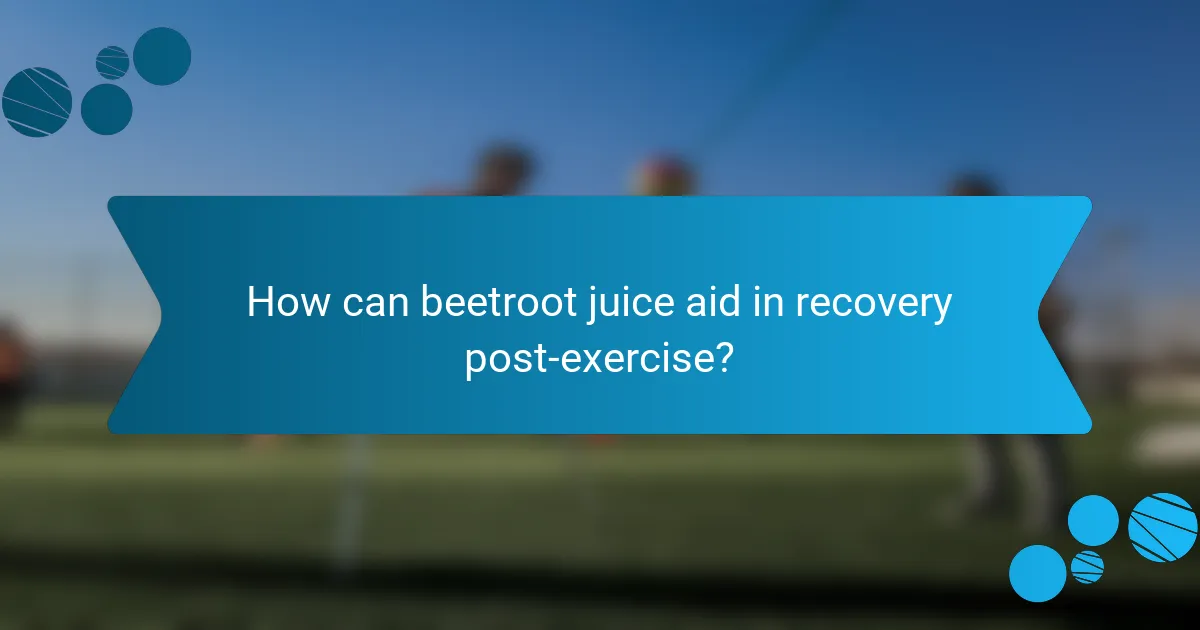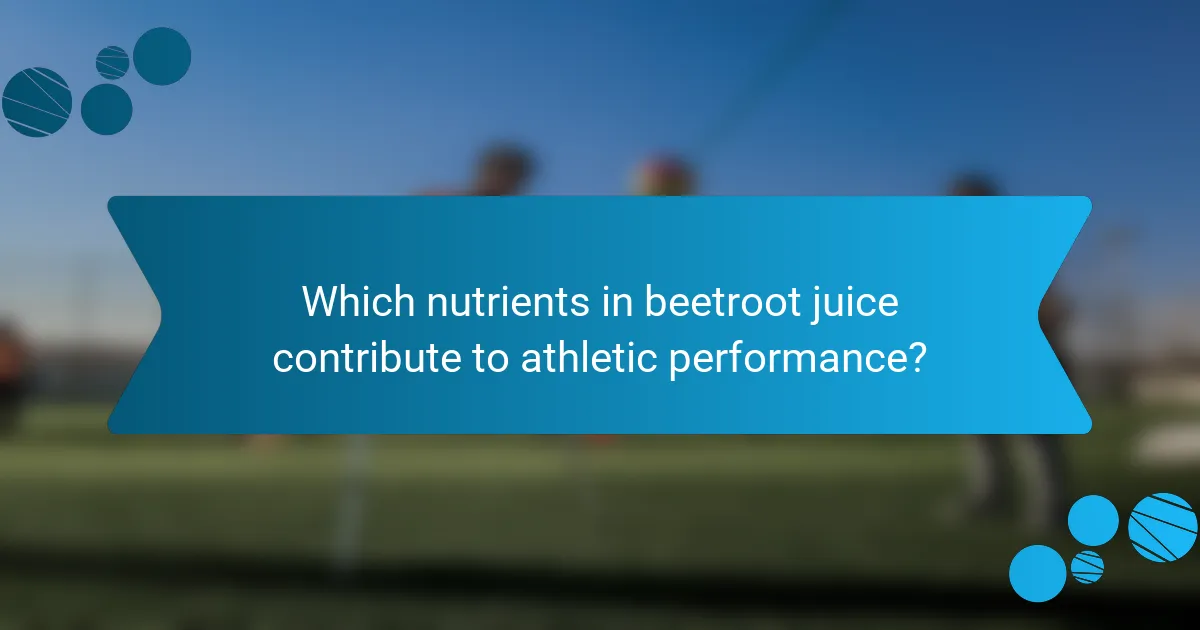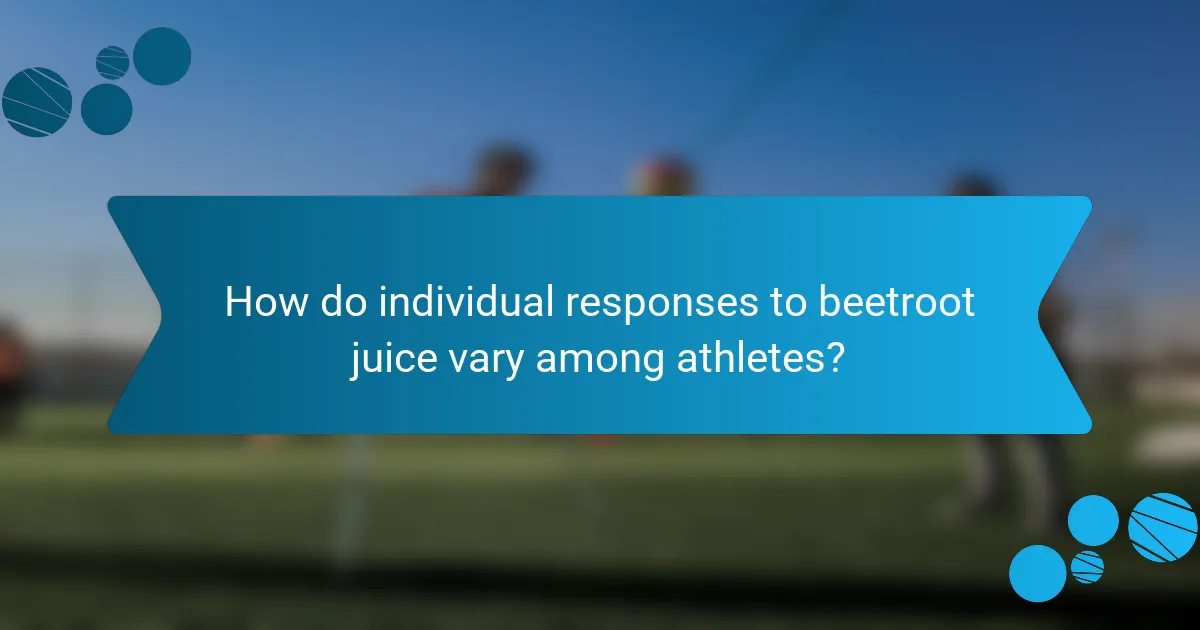Beetroot juice significantly enhances athletic endurance and recovery. It improves blood flow and oxygen delivery to muscles, reduces fatigue, and accelerates muscle recovery. Regular consumption can lead to cumulative benefits, optimizing performance over time. Additionally, its antioxidant properties help combat inflammation, further supporting athletes in their training regimens.

What are the key benefits of beetroot juice for athletic performance?
Beetroot juice enhances athletic performance by improving endurance, reducing fatigue, and accelerating recovery. Its high nitrate content boosts nitric oxide levels, leading to better blood flow and oxygen delivery to muscles. Studies show that consuming beetroot juice can increase time to exhaustion by up to 16%. Additionally, it aids in muscle recovery by decreasing muscle soreness post-exercise.
How does beetroot juice enhance endurance during exercise?
Beetroot juice enhances endurance during exercise by improving blood flow and oxygen delivery to muscles. This effect is primarily due to its high nitrate content, which converts to nitric oxide in the body. Nitric oxide helps to dilate blood vessels, increasing circulation and reducing the oxygen cost of exercise. Studies show that consuming beetroot juice can lead to a 15% increase in exercise performance, especially in endurance activities. Additionally, it may accelerate recovery by reducing muscle soreness post-exercise.
What role does nitric oxide play in the benefits of beetroot juice?
Nitric oxide enhances athletic endurance and recovery by improving blood flow and oxygen delivery. This vasodilator effect allows for better nutrient transport to muscles during exercise. Studies indicate that beetroot juice, rich in nitrates, significantly boosts nitric oxide levels, leading to enhanced performance and reduced fatigue. Additionally, increased nitric oxide production supports faster recovery post-exercise by aiding in muscle repair and reducing soreness.

How can beetroot juice aid in recovery post-exercise?
Beetroot juice aids recovery post-exercise by enhancing blood flow and reducing muscle soreness. Its high nitrate content improves oxygen delivery to muscles, promoting efficient recovery. Studies show that athletes consuming beetroot juice experience quicker recovery times and less fatigue. Additionally, the antioxidants in beetroot help combat oxidative stress, further supporting recovery.
What are the antioxidant properties of beetroot juice?
Beetroot juice has potent antioxidant properties that enhance athletic endurance and recovery. The high levels of betalains in beetroot juice combat oxidative stress, reducing inflammation and muscle soreness post-exercise. Additionally, beetroot juice improves blood flow and oxygen delivery, which supports overall athletic performance. Studies show that consuming beetroot juice can lead to a significant increase in time to exhaustion during endurance activities.
How does beetroot juice reduce muscle soreness after workouts?
Beetroot juice reduces muscle soreness after workouts by enhancing blood flow and reducing inflammation. Its high nitrate content converts to nitric oxide, improving oxygen delivery to muscles. This process helps decrease exercise-induced muscle damage and soreness. Studies show that athletes consuming beetroot juice experience less muscle soreness and faster recovery times. The unique attribute of beetroot juice is its ability to improve endurance while providing anti-inflammatory benefits, making it an effective recovery aid.

Which nutrients in beetroot juice contribute to athletic performance?
Beetroot juice enhances athletic performance primarily through its high nitrate content, which improves blood flow and oxygen delivery to muscles. Key nutrients include nitrates, antioxidants, and vitamins.
Nitrate converts to nitric oxide, which reduces oxygen consumption during exercise, potentially enhancing endurance. Antioxidants in beetroot juice, such as betalains, help reduce inflammation and muscle soreness, aiding recovery. Additionally, vitamins like B6 and C support energy metabolism and immune function, further benefiting athletes.
What vitamins and minerals are found in beetroot juice?
Beetroot juice contains vitamins and minerals that enhance athletic endurance and recovery. Key nutrients include vitamin C, folate, potassium, and magnesium.
Vitamin C supports immune function and acts as an antioxidant. Folate aids in red blood cell production, enhancing oxygen transport. Potassium regulates fluid balance and muscle contractions. Magnesium contributes to energy production and muscle function.
These nutrients work synergistically to improve performance and recovery in athletes.
How does the carbohydrate content of beetroot juice support energy levels?
Beetroot juice enhances energy levels due to its high carbohydrate content, primarily in the form of natural sugars. These sugars provide a quick source of energy, crucial for athletic performance. Additionally, beetroot juice contains nitrates, which improve blood flow and oxygen delivery to muscles, further supporting endurance. Research indicates that consuming beetroot juice can lead to a significant increase in exercise performance, particularly in endurance sports.

What are the best methods for consuming beetroot juice for optimal benefits?
To consume beetroot juice for optimal benefits, drink it 30 to 60 minutes before exercise. This timing enhances athletic endurance and recovery.
Beetroot juice contains nitrates, which improve blood flow and oxygen delivery to muscles. A typical serving is 250 to 500 ml per day.
For maximum benefits, consider mixing beetroot juice with other ingredients like ginger or citrus for added flavor and nutrients.
Consistency matters; regular consumption can lead to improved performance over time.
Which forms of beetroot juice are most effective for athletes?
Cold-pressed beetroot juice is most effective for athletes due to its high nitrate content. This form enhances blood flow and oxygen delivery, improving endurance. Additionally, concentrated beetroot juice offers a potent dose of nutrients, beneficial for recovery. Athletes may also consider organic beetroot juice for fewer additives and pesticides, ensuring a cleaner product.
How can timing of intake influence the effects of beetroot juice?
Timing of intake significantly influences the effects of beetroot juice on athletic endurance and recovery. Consuming beetroot juice approximately 2-3 hours before exercise optimizes its nitrate content, enhancing blood flow and oxygen delivery to muscles. Research indicates that this timing can improve performance by up to 16% in endurance activities. Additionally, post-exercise intake aids in recovery, reducing muscle soreness and inflammation due to its antioxidant properties. Thus, strategic timing can maximize the benefits of beetroot juice for athletes.

How do individual responses to beetroot juice vary among athletes?
Individual responses to beetroot juice can significantly differ among athletes due to factors like genetics, training intensity, and dietary habits. Some athletes experience enhanced endurance and reduced fatigue, while others may see minimal effects. Research indicates that beetroot juice can improve oxygen utilization and blood flow, benefiting performance. However, individual variability in nitric oxide production affects how each athlete responds. Overall, while many athletes gain from beetroot juice, the extent of benefits varies widely.
What factors influence the effectiveness of beetroot juice on performance?
Several factors influence the effectiveness of beetroot juice on athletic performance. These include the concentration of nitrates, timing of intake, individual response, and exercise intensity.
Higher nitrate levels enhance nitric oxide production, improving blood flow and oxygen delivery. Consuming beetroot juice close to exercise maximizes its benefits, while individual variability affects responses to nitrates. Intense exercise may yield greater performance gains compared to moderate activities, showcasing beetroot juice’s unique role in endurance sports.
How does the frequency of consumption impact athletic outcomes?
Consuming beetroot juice frequently enhances athletic endurance and recovery. Regular intake boosts nitric oxide levels, improving blood flow and oxygen delivery to muscles. Studies show that athletes who consume beetroot juice regularly experience reduced fatigue and faster recovery times. For example, a study found that daily consumption led to a 16% increase in time to exhaustion during exercise.

What are the potential side effects or considerations when using beetroot juice?
Beetroot juice can cause mild side effects such as digestive discomfort, changes in urine color, and potential interactions with certain medications. Individuals with specific health conditions should consult a healthcare professional before use.
Are there any contraindications for specific athletes?
Yes, there are contraindications for specific athletes regarding beetroot juice consumption. Athletes with kidney issues should be cautious due to high oxalate levels in beetroot, which may lead to kidney stone formation. Additionally, individuals on certain blood pressure medications may experience interactions, as beetroot juice can lower blood pressure. Athletes with a history of gastrointestinal disorders should also be aware, as excessive intake may cause digestive discomfort. Always consult a healthcare professional before incorporating beetroot juice into a training regimen.
What should athletes be aware of regarding beetroot juice and hydration?
Athletes should be aware that beetroot juice enhances hydration and supports endurance. It contains nitrates that improve blood flow and oxygen delivery to muscles. Consuming beetroot juice before exercise can lead to better performance and quicker recovery. Additionally, it helps maintain electrolyte balance, crucial for hydration during intense workouts.
What are common misconceptions about beetroot juice benefits?
Common misconceptions about beetroot juice benefits include the belief that it only enhances performance without aiding recovery. In reality, beetroot juice supports both athletic endurance and post-exercise recovery due to its high nitrate content, which improves blood flow and reduces muscle soreness. Another misconception is that beetroot juice is only beneficial for elite athletes; however, studies show that it can enhance performance for recreational athletes as well. Additionally, some think that the effects are immediate, but regular consumption over time yields the best results.

How can athletes incorporate beetroot juice into their training regimen?
Athletes can incorporate beetroot juice into their training regimen to enhance endurance and recovery. Consuming beetroot juice before workouts can improve oxygen delivery to muscles, resulting in increased stamina.
Research indicates that drinking 500 mL of beetroot juice can boost nitric oxide levels, which helps improve blood flow. Athletes may experience reduced fatigue and quicker recovery times due to the anti-inflammatory properties of beetroot.
To effectively use beetroot juice, athletes should consider consuming it 2-3 hours prior to training sessions. Regular intake can lead to cumulative benefits, optimizing performance over time.
What are some practical tips for integrating beetroot juice into daily nutrition?
Integrating beetroot juice into daily nutrition can enhance athletic endurance and recovery. Start by consuming 250-500 ml of beetroot juice daily, ideally before workouts.
Pair beetroot juice with a balanced meal to maximize nutrient absorption. For convenience, add it to smoothies or use it as a salad dressing.
Monitor your body’s response and adjust intake based on performance and recovery needs. Consistency is key; regular consumption may improve stamina and reduce muscle soreness.
Which recipes can enhance the taste and benefits of beetroot juice?
To enhance the taste and benefits of beetroot juice, consider these recipes.
1. Beetroot and Ginger Smoothie: Combine beetroot juice, ginger, banana, and almond milk for a refreshing drink that boosts athletic endurance.
2. Beetroot and Citrus Salad: Mix roasted beetroot with orange segments and arugula, drizzled with olive oil for a nutrient-rich side dish.
3. Beetroot Hummus: Blend beetroot with chickpeas, tahini, garlic, and lemon juice for a protein-packed dip that supports recovery.
4. Beetroot and Berry Juice: Blend beetroot with mixed berries and a splash of lemon for a delicious, antioxidant-rich beverage.